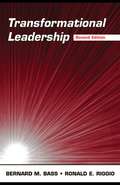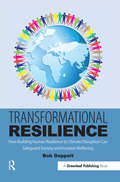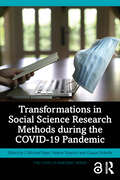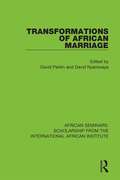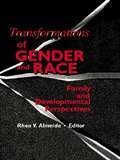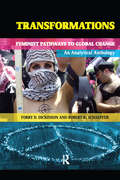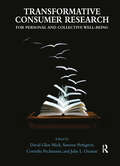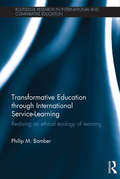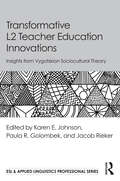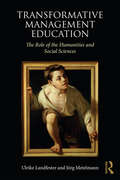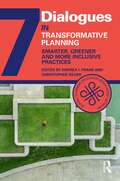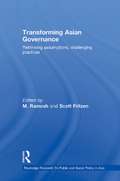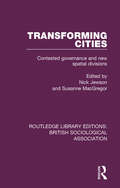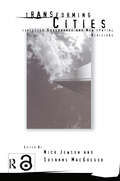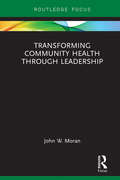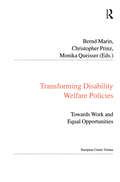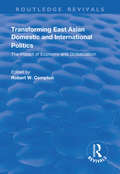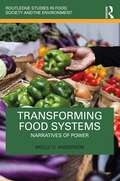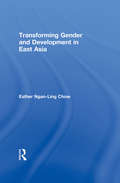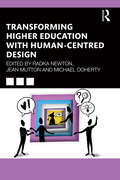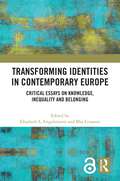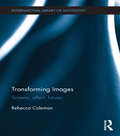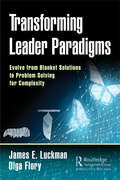- Table View
- List View
Transformational Leadership: A Comprehensive Review Of Theory And Research
by Bernard M. Bass Ronald E. RiggioTransformational Leadership, Second Edition is intended for both the scholars and serious students of leadership. It is a comprehensive review of theorizing and empirical research that can serve as a reference and starting point for additional research on the theory. It can be used as a supplementary textbook in an intense course on leadership--or as a primary text in a course or seminar focusing on transformational leadership.New in the Second Edition:*New, updated examples of leadership have been included to help illustrate the concepts, as well as show the broad range of transformational leadership in a variety of settings.*New chapters have been added focusing specifically on the measurement of transformational leadership and transformational leadership and effectiveness.*The discussion of both predicators and effects of transformational leadership is greatly expanded.*Much more emphasis is given to authentic vs. inauthentic transformational leadership.*Suggestions are made for guiding the future of research and applications of transformational leadership.*A greatly expanded reference list is included.
Transformational Resilience: How Building Human Resilience to Climate Disruption Can Safeguard Society and Increase Wellbeing
by Bob DoppeltUsing the author’s extensive experience of advising public, private and non-profit sectors on personal, organization, and community behavioral and systems change knowledge and tools, this book applies a new lens to the question of how to respond to climate change. It offers a scientifically rigorous understanding of the negative mental health and psychosocial impacts of climate change and argues that overlooking these issues will have very damaging consequences. The practical assessment of various methods to build human resilience offered by Transformational Resilience then makes a powerful case for the need to quickly expand beyond emission reductions and hardening physical infrastructure to enhance the capacity of individuals and groups to cope with the inevitable changes affecting all levels of society.Applying a trauma-informed mental health and psychosocial perspective, Transformational Resilience offers a groundbreaking approach to responding to climate disruption. The book describes how climate disruption traumatizes societies and how effective responses can catalyze positive learning, growth, and change.
Transformations in Social Science Research Methods during the COVID-19 Pandemic (The COVID-19 Pandemic Series)
by J. Michael Ryan Valerie Visanich Gaspar BrändleThis volume explores how researchers made innovative use of online technologies to innovate, define, and transform research methodologies in light of the varying impacts of the COVID-19 pandemic, especially those related to the ability to conduct qualitative research.The onset of the COVID-19 pandemic resulted in a radical shift in the way that people all over the world were/have been able to live, work, study, and conduct their daily lives. Academics and other professionals who routinely engage in research were no exception. The sudden, continued, and uneven need for health mandates calling for physical distancing added a particular layer of complexity for those who used research methods that typically required face-to-face interactions. Continued technological developments associated with the Internet had already given rise to ongoing debates on innovative methodological thinking and practices. The COVID-19 pandemic has further accentuated how indispensable the internet has become for the private and public lives of those with access to it, including for their employment, education, leisure, and social interactions. For those fortunate enough to have access to them, communication software such as Zoom and Google Meet have also become indispensable digital resources for researchers seeking to continue conducting research during lockdowns and quarantines, and beyond. More than ever, researchers are finding it useful, even necessary, to equip themselves with online research tools in order to be able to continue conducting their fieldwork.Drawing on research and case studies from around the world, this volume serves as a guidebook for those interested in attuning their own research methods to a world still struggling to grapple with the impacts of the COVID-19 pandemic.
Transformations of African Marriage (African Seminars: Scholarship from the International African Institute #6)
by David Parkin David NyamwayaOriginally published in 1987, this book shows that there is still considerable continuity in the practices and ideas of marriage in Afican against a background of social and economic change. This book discusses the diverse marriage forms in Africa and explores the different systems some of which can be understood in terms of Levi-Strauss's distinciton between complex and semi-complex structures, while others throw up questions of filiation, child custoidanship and rights secured through bridewealth transactions.
Transformations of Gender and Race: Family and Developmental Perspectives
by Rhea AlmeidaTransformations of Gender and Race will help you become a better therapist by arming you with new theories and practices that concern inclusiveness of identity, psyche, and culture in the therapy room. This book radically shifts current thinking in systemic theory and practice with individuals, children, couples, and families, giving you a fresh perspective on working with your clients of all cultural backgrounds and both genders.In Transformations of Gender and Race: Family and Developmental Perspectives, you’ll discover superb contemporary thinking in cultural studies, post-colonial theory, gender theory, queer theory, and clinical and research work with numerous populations who have been overlooked and undertheorized. You’ll gain a wealth of knowledge and expertise from its contributors who have been immersed in the issues they address.The chapters in Transformations of Gender and Race provide a superb, state-of-the-art bibliography of contemporary thinking in cultural studies, post-colonial theory, and clinical and research work with numerous populations who have been “overlooked and undertheorized.” The new paradigms dicussed and practiced in Transformations in Gender and Race encourage cultural multiplicity, inclusiveness, and understanding. A pallete of contemporary thinking, this insightful book will guide you in: how to bring diversity into the lived experience of young children numerous theoretical paradigms couples therapy men&’s work and children addressing the intersections of gender, race, class, and culture in the therapy room transformations regarding race and gender the inclusiveness of feminismA wealth of expertise and sharp observation that reaches out to enrich and humanize therapy practices, Transformations of Gender and Race addresses the interactions between gender, class, race, sexual orientation, and age. Creative and in-depth, this volume articulates a perspective that connects all of these contexts of potential oppression and privilege. You will gain a deeper understanding of numerous theoretical paradigms for working with couples, individuals, and children that will improve your practice.
Transformations: Feminist Pathways to Global Change
by Robert K. Schaeffer Torry D. DickinsonBringing feminist and world-systems theories together, this analytic anthology examines the rise of intersecting, women-centered movements that contribute to alternative development and the rise of new societies. The authors consider feminist movements and humanistic transformations that create new work and market relations, promote democracy and equality, redefine gender and sexuality, regenerate the environment, and construct nonviolent and peaceful relations. At the end of each chapter, articles by feminist theorists and practitioners on these topics are included to illustrate the analysis. Using a global, historical framework, the book shows how diverse, multicultural, and international feminist ideas can be brought together to provide a comprehensive and differentiated understanding of change.
Transformations: Thinking Through Feminism (Transformations)
by Sara Ahmed Jane Kilby Beverley Skeggs Celia Lury Maureen McNeilWith contributions from some of the most important current feminist thinkers, Transformations traces both the shifts in thinking that have allowed feminism to arrive at its present point, and the way that feminist agendas have progressed in line with wider social developments. A thorough reassessment of feminism's place in contemporary life, the authors engage in current debates as diverse as globalization, technoscience, embodiment and performativity, taking feminism in fresh directions, mapping new territory and suggesting alternative possibilities.
Transformative Consumer Research for Personal and Collective Well-Being
by Saskia StachowitschDaily existence is more interconnected to consumer behaviors than ever before, encompassing many issues of well-being. Problems include unhealthy eating; credit card mismanagement; alcohol, tobacco, pornography, and gambling abuse; marketplace discrimination; and ecological deterioration; as well as at-risk groups who are impoverished, impaired, or elderly. Opportunities for well-being via consumer behaviors include empowerment via the Internet, product sharing, leisure pursuits, family consumption, and pro-environmental activities, among others. In 2005 the Association for Consumer Research launched Transformative Consumer Research (TCR). Its mission is to foster research on quality of life that is both rigorous and applied for better assisting consumers, their caregivers, policy administrators, and executives. This edited volume includes 33 chapters on a wide range of topics by expert international authors. All royalties from sales of this book are donated to the Association to support TCR grants.
Transformative Education through International Service-Learning: Realising an ethical ecology of learning (Routledge Research in International and Comparative Education)
by Philip M BamberTransformative learning is a compelling approach to learning that is becoming increasingly popular in a diverse range of educational settings and encounters. This book reconceptualises transformative learning through an investigation of the learning process and outcomes of International Service-Learning (ISL), a pedagogical approach that blends student learning with community engagement overseas and the development of a more just society. Drawing upon key philosophers and theorists, Bamber offers an integrated, multi-dimensional approach, linking transformative learning to the development of the authentic self, and analysing the aesthetic, moral and relational dimensions of ISL in an increasingly globalized world. Chapters explore rich empirical data to provide a timely framework and ethical ecology of transformative learning, detailing the challenges facing the approach, and how it can be embedded at the levels of practice, institutional ethos and partnership. Transformative Learning through International Service-Learning will appeal to academics, researchers, teachers, instructors and leaders in the fields of service-learning, international education, character education and in adult learning and education. It will also be of interest to practitioners working in international education, development education, volunteering, service-learning and community engagement.
Transformative L2 Teacher Education Innovations: Insights from Vygotskian Sociocultural Theory (ESL & Applied Linguistics Professional Series)
by Karen E. Johnson Paula R. Golombek Jacob RiekerTransformative L2 Teacher Education Innovations features empirical research studies informed by Vygotskian Sociocultural Theory (VSCT) that are explicitly and intentionally designed to transform second language (L2) teacher reasoning and thinking, as well as L2 teaching practices and pedagogical choices.With contributions from scholars and practicing teacher educators, each chapter highlights a designed innovative professional development experience that has created a “new” social situation of development with a clearly articulated “ideal” for L2 teachers to embrace and/or achieve. Each study articulates the rationale and unique design features of the innovation, the intentionality behind the choices made when designing and enacting the innovation, and the quality, character, and outcomes of the intervention for L2 teachers. Furthermore, each study documents the forms of mediation that are offered to support L2 teacher professional development, such as conceptual tools, goal-directed activities, and/or social relations/interactions.The book offers insight into the internal logic of VSCT-informed L2 Teacher Education and provides concrete examples of how L2 teacher educators can adopt a Vygotskian-informed pedagogical stance in their teacher education practices. The edited collection is especially applicable for scholars and teacher educators in language education, applied linguistics, TESOL, and bilingual education who engage with Vygotskian Sociocultural Theory.
Transformative Management Education: The Role of the Humanities and Social Sciences (Routledge Advances in Management and Business Studies)
by Ulrike Landfester Jörg MetelmannDue to the recent global financial crises, academic business schools have come in for much criticism, having, in the eyes of the public, failed in their responsibility to society by teaching future managers only how to increase their personal gain without any consideration as to their actions’ social and cultural consequences. Realising that there is a pressing need to innovate their educational offers accordingly, business schools are beginning to turn to the humanities and social sciences to improve on the understanding and thus the teaching of management. This book is the result of an empirical study conducted at eight academic business schools that either already practise or are beginning to practise linking management education to the humanities and social sciences. Gathered mostly in interviews our research team conducted during site visits to these schools, the material presented shows three major fields of concern: how to shift the focus from instrumental to transformative learning, how to reframe the concept of disciplinary subject matter towards a more relational understanding of knowledge—especially in the light of the impact digitalisation is having on education—and how to address the organisational, as well as the political consequences of management education turning towards the inclusion of the humanities and social sciences strategically. The findings indicate that the humanities and social sciences indeed offer knowledge which can significantly help management education with meeting the challenges of the twenty-first century. Innovating management education by making it part of its program portfolios proves a challenge in and of itself in the face of a university system which still determinedly clings to disciplinary segregation. Reforming management education towards an engagement with fields of knowledge traditionally at best ignored and at worst vilified as being completely useless in the "real world" may therefore place academic business schools at the forefront of a movement that is beginning to reshape the educational landscape as a whole. This book will be of value to researchers, academics and students in the fields of business, management studies, organisational studies and education studies.
Transformative Planning: Smarter, Greener and More Inclusive Practices
by Andrea I. FrankThe Dialogues in Urban and Regional Planning series offers a selection of some of the best scholarship in urban and regional planning from around the world with internationally recognized authors taking up urgent and salient issues from theory, to education for and practice of planning. This 7th volume features contributions on the theme of Transformative Planning: Smarter, Greener and More Inclusive Practices. It includes chapters from leading planning scholars and practitioners who critically examine how transformative planning practices seek to reduce inequalities, promote sustained, inclusive and sustainable economic growth, achieve gender equality, improve human health and well-being, foster resilience of urban communities and protect the environment and thereby change urban planning paradigms. Several case studies of emerging transformative planning interventions illustrate practical ways forward. Transformative Planning offers provocative insights into the global planning community’s struggle and contribution to tackle the major challenges to society in the 21st century. It will be of use for advanced undergraduate and graduate courses in the wide-ranging fields encompassed by urban studies, sustainability studies, and urban and regional planning. The Dialogues in Urban and Regional Planning (DURP) series is published in association with the Global Planning Education Association Network (GPEAN) and its member national and transnational planning schools associations.
Transforming Asian Governance: Rethinking assumptions, challenging practices (Routledge Research On Public and Social Policy in Asia)
by M. Ramesh Scott FritzenThere are a multitude of hazards that confront attempts to change institutional or political orders in pursuit of good governance. Even seemingly technical prescriptions run up against local political and social realities which make their adoption difficult and, if adopted, require significant modification of the original prescriptions. Moreover, the technical, rationalist and/or normative language employed in the good governance discourse masks contests over power, rights, resources, and actors’ conflicting interests. There is a definite need to situate the good governance debate in the local context rather than reflexively adopting a universalistic positing of the fact or desirability of governance convergence across countries and sectors because the reality is that the world-wide deployment of good governance rhetoric is not accompanied by convergence in thinking or practices across nations. Transforming Asian Governance asks: • How do good governance principles translate into local settings?• How do local settings influence the conception of what is good governance and how the debate over good governance is deployed as a political or administrative strategy? Using case studies in governance from Thailand, the Philippines, Pakistan, Malaysia, India, Indonesia, Korea and Japan, this book will be essential reading for anyone interested in the public and social policy of Asia, and international and comparative governance more generally.
Transforming Cities: Contested Governance and New Spatial Divisions (Routledge Library Editions: British Sociological Association #13)
by Nick Jewson Susanne MacGregorTransforming Cities examines the profound changes that have characterised cities of the advanced capitalist societies in the final decades of the twentieth century. It analyses ways in which relationships of contest, conflict and co-operation are realised in and through the social and spatial forms of contemporary urban life. This book focuses on the impact of economic restructuring and changing forms of urban deprivation and social exclusion. It contends that these processes are creating new patterns of social division and new forms of regulation and control.
Transforming Cities: New Spatial Divisions and Social Tranformation (Routledge Library Editions: British Sociological Association Ser. #13)
by Susanne Macgregor Nick JewsonThis collection examines the profound transformations that have characterised cities of the advanced capitalist societies in the final decades of the 20th century. It analyses ways in which relationships of contest, conflict and cooperation are realised in and through the social and spatial forms of contemporary urban life. In particular, the essays focus on the impact of economic restructuring and changing forms of urban governance on patterns of urban deprivation and social exclusion. These processes, they contend, are creating new patterns of social division and new forms of regulation and control.
Transforming Cities: New Spatial Divisions and Social Tranformation (Routledge Library Editions: British Sociological Association Ser. #13)
by Nick Jewson Susanne MacGregorThis collection examines the profound transformations that have characterised cities of the advanced capitalist societies in the final decades of the 20th century. It analyses ways in which relationships of contest, conflict and cooperation are realised in and through the social and spatial forms of contemporary urban life. In particular, the essays focus on the impact of economic restructuring and changing forms of urban governance on patterns of urban deprivation and social exclusion. These processes, they contend, are creating new patterns of social division and new forms of regulation and control.
Transforming Community Health through Leadership
by John W. MoranAs the United States faces increasingly difficult and trenchant public health problems, from the Zika virus to the obesity epidemic to the opioid crisis, population health is a growing area of concern for public health organizations, particularly how to care for populations effectively on a shoestring budget. Though little discussed in the mainstream media, community health improvement organizations are increasingly partnering and forming coalitions with local hospitals, working together to improve traditional medical care. But with the pace of change in health care policy, these coalitions must be thoughtfully lead and managed. This new book from John W. Moran, Senior Quality Advisor to the Public Health Foundation, demonstrates how to build, operate, manage, and sustain a community health improvement coalition once it is formed. Offering the reader practical examples and guidance on forming and sustaining a community health coalition, this book demonstrates the ways in which the success of a coalition depends upon a stable anchor organization and a committed leader. Chapters focus on each of these roles and how to achieve success in each: examining what needs improvement, why it is important to improve now, how it will be done, and where in the community improvement can have the most impact. The last chapter offers a case study exploring a community health coalition and leader to illustrate application of the concepts introduced throughout the book. Transforming Community Health through Leadership is designed specifically to prepare governmental public health, health care, and community leaders to take advantage of the ever-changing landscape of public health and health care in concrete ways to improve population health.
Transforming Disability Welfare Policies: Towards Work and Equal Opportunities (Public Policy and Social Welfare)
by Christopher PrinzBringing together contributions from institutions such as the OECD, the WHO, the World Bank and the European Disability Forum, as well as policy makers and researchers, this volume focuses on disability and work. The contributors address a wide range of issues including what it means to be disabled, what rights and responsibilities society has for people with disabilities, how disability benefits should be structured, and what role employers should play. Fundamental reading for specialists in disability, social protection and public economics, and for social policy academics, researchers and students generally, Transforming Disability Welfare Policies makes an enormous contribution to the literature.
Transforming East Asian Domestic and International Politics: The Impact of Economy and Globalization (The\international Political Economy Of New Regionalisms Ser.)
by Robert ComptonThis title was first published in 2002: This text attempts to bridge the gap between international relations and comparative politics, with particular reference to East Asia. The book begins with an exploration of the theme of globalization and the impact it has on the conduct of international relations and the process of domestic politics. It discusses the fact that domestic actors are unable to assume an insular political environment as previously, referring to the constant reception of stimuli which force adjustments to approaches in the conduct of domestic and international affairs. Globalization's ubiquitous presence reflects a changed reality for both state and non-state actors - no policy-maker can afford to ignore or underemphasize its role in shaping ior altering the course of public
Transforming Food Systems: Narratives of Power (Routledge Studies in Food, Society and the Environment)
by Molly D. AndersonThis book focuses on the contested nature and competing narratives of food system transformations, despite it being widely acknowledged that changes are essential for the safeguarding of human and planetary health and well-being.The book approaches food system transformation through narratives, or the stories we tell ourselves and others about how things work. Narratives are closely connected with theories of change, although food system actors frequently lack explicit theories of change. Using political economy and systems approaches to analyze food system transformation, the author focuses on how power in food systems manifests, and how this affects whom can obtain healthy and culturally appropriate food on a reliable basis. Among the narratives covered are agroecology, food sovereignty and technological innovation. The book draws on interviews and recorded speeches by a broad range of stakeholders, including international policymakers, philanthropists, academics and researchers, workers in the food and agricultural industries and activists working for NGOs and social movements. In doing so, it presents contrasting narratives and their implicit or explicit theories of change. This approach is vitally important as decisions made by policymakers over the next few years, based on competing narratives, will have a major influence on who will eat what, how food will be produced, and who will have a voice is shaping food systems. The overarching contribution of this book is to point toward the most promising pathways for achieving sustainable food systems and refute pathways that show little hope of achieving a more sustainable future.This book will be of great interest to students, scholars and policymakers interested in creating a sustainable food system which will ensure a food secure, socially just and environmentally sustainable future.
Transforming Gender and Development in East Asia
by Esther Ngan-ling ChowTransforming Gender and Development in East Asia brings together a collection of original essays from top scholars in the United States and Asia to explore the centrality of gender in the process of economic development in East Asia. Contributors demonstrate through ethnography, personal narratives, field observation, and in-depth interviews the essential parts women have played in the national growth, economic restructuring, and industrialization of East Asian countries, including South Korea, Taiwan, China, Hong Kong, Singapore, and China.
Transforming Higher Education With Human-Centred Design
by Radka NewtonEncouraging a collaborative and thoughtful approach to the wicked problems facing higher education (HE), this book is a showcase of pioneering educators who believe that well-designed education is good for everyone - learners, teachers, education administrators, the learning organisation and the world.Through case studies, thought pieces and practical advice, this book takes a fresh look at the application of Design Thinking and Service Design in a variety of university contexts. Human-centred design perspectives show up the fact that decades of rhetoric about student-centred learning have often left the student still effectively marginalised from change processes. The reader will encounter ample tools and techniques of design and co-creation that can enhance the student experience, from applicant to alumnus. More importantly, the book sets out, in actionable ways, how we can make our universities more effective at supporting students for success, and to become places where people are more empowered to make those changes. University academics, learning support staff, managers and professional staff, as well as HE policy makers and professional bodies, will appreciate this clear and practical guide to exploring service design in the new context of education.
Transforming Identities in Contemporary Europe: Critical Essays on Knowledge, Inequality and Belonging
by Elisabeth L. EngebretsenInterdisciplinary in perspective, this book explores contemporary struggles around ‘identity politics’ in Europe, offering a unique glimpse into contemporary tensions and paradoxes surrounding identities, belonging, exclusions and their deep-seated gendered, colonial and racist legacies. With a particular focus on the Nordic region, it provides insights into the ways in which people who find themselves in minoritized positions struggle against multiple injustices. Through a series of case studies documenting counter-struggles against racist, colonialist, sexist forms of discrimination and exclusion, Transforming Identities in Contemporary Europe asks how the paradigm and politics of the welfare state operate to discriminate against the most marginalized, by instating a naturalized hierarchy of human-ness. As such it will appeal to scholars across the social sciences and humanities with interests in race, gender, colonialism and postcolonialism, citizenship and belonging.
Transforming Images: Screens, affect, futures (International Library of Sociology)
by Rebecca ColemanContemporary social and cultural life is increasingly organised around a logic of self-transformation, where changing the body is seen as key. Transforming Images examines how the future functions within this transformative logic to indicate the potential of a materially better time. The book explores the crucial role that images have in organising an imperative for transformation and in making possible, or not, the materialisation of a better future. Coleman asks the questions: which futures are appealing and to whom? How do images tap into and reproduce wider social and cultural processes of inequality? Drawing on the recent ‘turns’ to affect and emotion and to understanding life in terms of vitality, intensity and ‘liveness’ in social and cultural theory, the book develops a framework for understanding images as felt and lived out. Analysing different screens across popular culture – the screens of shopping, makeover television programmes, online dieting plans and government health campaigns – it traces how images of self-transformation bring the future into the present and affectively ‘draw in’ some bodies more than others. Transforming Images will be of interest to students and scholars working in sociology, media studies, cultural studies and gender studies.
Transforming Leader Paradigms: Evolve from Blanket Solutions to Problem Solving for Complexity
by James E. Luckman Olga FloryAn easy read with clear examples and engaging stories, this book is a treat for leaders who are interested in totally transforming the way they work. Luckman and Flory help leaders and organizations shift from a solutions mindset to a problem-solving culture that results in flow and growth where everyone in the organization can become a winner. Anand V. Tanikella, Vice President R&D, Abrasives Worldwide, Saint-Gobain Luckman and Flory explain how to create a platform for change and a culture of meaningful continuous improvement through what they call "Problem Solving for Complexity." This approach is about engaging everybody in the organization to improve every aspect of how work gets done. Read this book if you want to be a real change leader, not just the person who goes around talking about the need for change. Robert Kessiakoff, Coach/Consultant, Partner LTGe, Sweden [This book] describes how the leader, through changing his or her own behaviors and practices, can transform an organization that is slow to adapt into one that solves problems organically. The book is an important read for leaders and managers at all levels. Peter Ward, Senior Associate Dean for Academics, Richard M. Ross Chair in Management, Professor of Management Sciences, Director, Center for Operational Excellence, Ohio State University Organizational transformation is difficult, and despite expensive continuous improvement programs, most change efforts fail. This pattern, James E. Luckman and Olga Flory argue, is due to the fact that most change efforts start with senior leaders assigning an external or internal consulting group to attempt to drive change from the top down. Leaders today can no longer roll out solutions in the hopes of seeing better results. What they can do is play an active role in helping to transform their organization from "blanket solutions" thinking to learning how to solve complex business problems in a rapidly changing world. Drawing upon decades of leadership experience and years of research with executives across many different industries, Luckman and Flory make a persuasive case that most companies have not been able to stay ahead in what is an increasingly turbulent business environment because they simply have not made the cultural changes required to do so. In discussing how to facilitate this culture change, the authors share a model for leadership designed to guide an organization to extraordinary new levels of performance by focusing on three key areas: building a framework for problem-solving, encouraging respectful communication, and accelerating the pace at which the organization learns. The result is more energized team members who are dedicated to their daily work in an organization that is better positioned to achieve operational excellence. Readers will also find powerful stories from executives who have effectively changed their approach to leadership, all of which serve to inspire more leaders to take the leap and become "problem-solvers for complexity." Transforming Leader Paradigms is a book about strengthening every organization’s capacity to solve complex business problems. But, more importantly, it’s about what leaders must change in themselves to help their team members solve problems methodically, start to look at the world differently using complexity theory, and understand what it means to create real value for customers. For leaders who are willing to examine their own behaviors, this book is a welcome change from the steady stream of business books on the market that emphasize charismatic and/or heroic leadership as the key to achievement and success.
